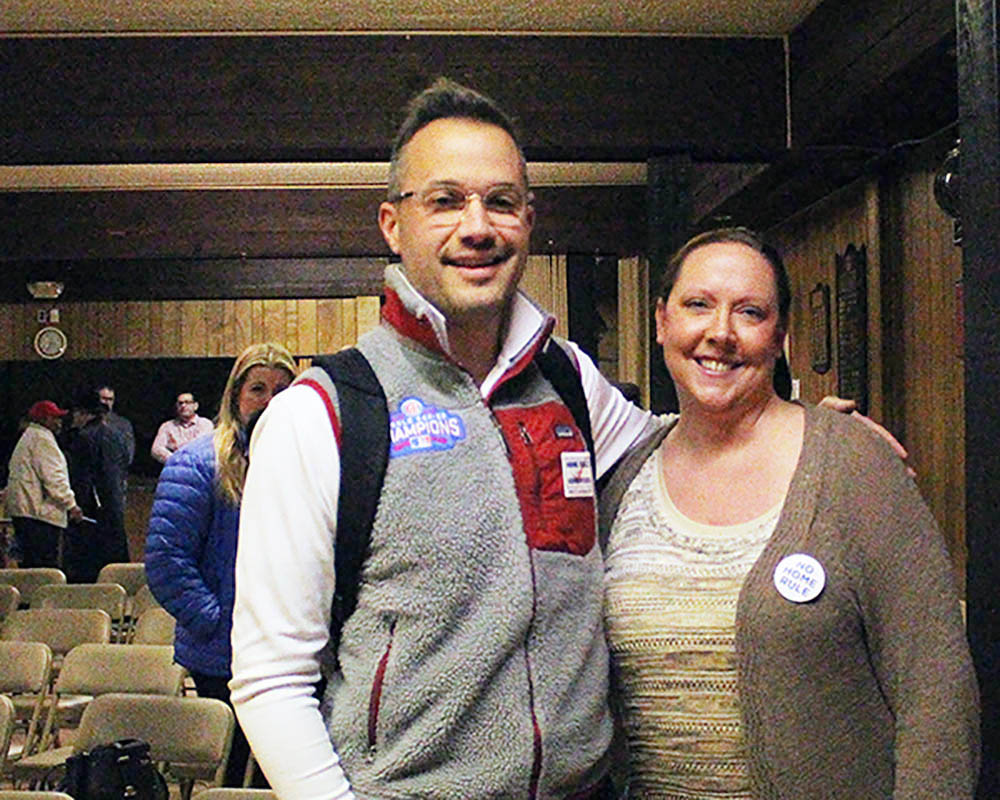The Vote No Home Rule Committee, a group of residents campaigning in opposition to granting home rule authority to the village, held a forum Sunday, March 4, to present the case against the proposal.
The Vote No Home Rule Committee, a group of residents campaigning in opposition to granting home rule authority to the village, held a forum Sunday, March 4, to present the case against the proposal.
Homewood residents will be asked to decide whether to grant the village home rule authority on the March 20 election ballot.

acquaintances, Nick Quirke,
left, and Jen Sjoblom greet
each other following a
forum sponsored by Vote
No Home Rule. Quirke is
a leader of Homewood
Citizens for Home Rule,
and Sjoblum is a leader
of the Vote No group.
(Photo by Eric Crump/
H-F Chronicle)
Tony Denevelllis of the Southland Chamber of Commerce served as moderator. Speakers included Debbie Hart, chairperson of Vote No Home Rule; Jen Sjoblom, vice chairperson of the organization; Thomas Joseph, local government affairs director for the Mainstreet Organization of Realtors; and James Tobin, an economist and founder of Taxpayers United of America.
The local speakers framed the issue as a matter of representation, power and taxation.
Hart, a 31-year resident of Homewood, said her main objection is what she sees as a shift of power from voters to village officials. If home rule is approved, village officials will have the authority to raise taxes, establish new fees, take on more debt and implement more regulations than they can now.
“Voting on home rule is not just voting on a small sales tax or on the cleaning up of rental properties, but on the entire package on home rule powers now and for the foreseeable future,” she said. “We prefer the checks and balances we have now. If the village wants a tax increase or wants to take on debt beyond a certain amount, they must make their case to the people and the people of Homewood can vote yes or no.”
Hart acknowledged that the board of trustees has passed several ordinances that would limit its exercise of home rule powers. The ordinances require the board to abide by non-home rule property tax and debt limits and to hold public hearings prior to enacting tax increases. Tax increases would also require a two-thirds majority of trustees to pass.
Hart said the ordinances are not enough to ensure those limits will be abided by in the future.
“The ordinances have no teeth,” she said. “Ordinances can be altered or rescinded at any time and they contain broad exemptions.”
Sjoblom, a realtor and also a long-time resident, said the move to home rule could result in the village imitating state government’s dependence on too much regulation, too much debt and too much taxation rather than solving systemic problems.
“I am not a proponent of increased spending and taxation when alternatives are available or the issues are minor in the grand scheme of things,” she said. “In a state and county where multiple layers of taxation already exist, residents are finding themselves struggling to make ends meet. Kicking the bucket further down the road for future generations to deal with should not be an option. We would prefer not to open the door to that possibility in the first place.”
Joseph said he had attended three recent forums on the issue and found the information and discussions to be constructive, but as a representative of the real estate profession, he remains opposed to home rule.
His remarks focused on the consequences of home rule from the real estate profession’s perspective. He said the result can be a proliferation of taxes and regulations that risk impeding growth and investment in the community.
He pointed to crime-free housing regulations, which Homewood is considering, as an example of a potential problem enabled by home rule.
Crime-free housing programs typically require registration with the village of rental property, landlord training and rules that both landlords and tenants agree to abide by. The purpose, as the name suggests, is to reduce crime.
“Homewood is a vital community. Investors want to come here. They see it as a win,” Joseph said. “If you impose crime-free housing, some of those landlords may say, ‘Maybe I don’t want to own here.'”
He also listed a variety of taxes that can be imposed by home rule communities, including taxes on gasoline, dry cleaning, storage, parking, car washes and sugary beverages.
“Not that this community will do some or all of those, but we’ve seen them done elsewhere,” he said.
Tobin’s remarks focused less specifically on home rule and more on what he sees as a general tendency of government to resort to excessive taxation if given the opportunity.
He said the state’s underfunded pension system was an example.
“There’s just no way these pensions can be paid. It’s impossible,” he said. Home rule, he added, “is a tax grab, and they want it for the pensions.”
He did not specifically connect the issue to village pension funds, but he drew the audience’s attention to pension benefits for local school district retirees.
“The taxpayers are serfs,” he said. “Government pensions are legalized theft.”
He characterized home rule as a step toward totalitarian government.
“If you want that, go to Russia or China,” he said.
In her remarks at the close of the meeting, Sjoblom noted how divisive the issue had been in the community.
“I believe it is very fair to say that residents of Homewood care very passionately about this town, which is what has created some of this conflict,” she said. “What we are facing is a difference of opinion on village governance.”


